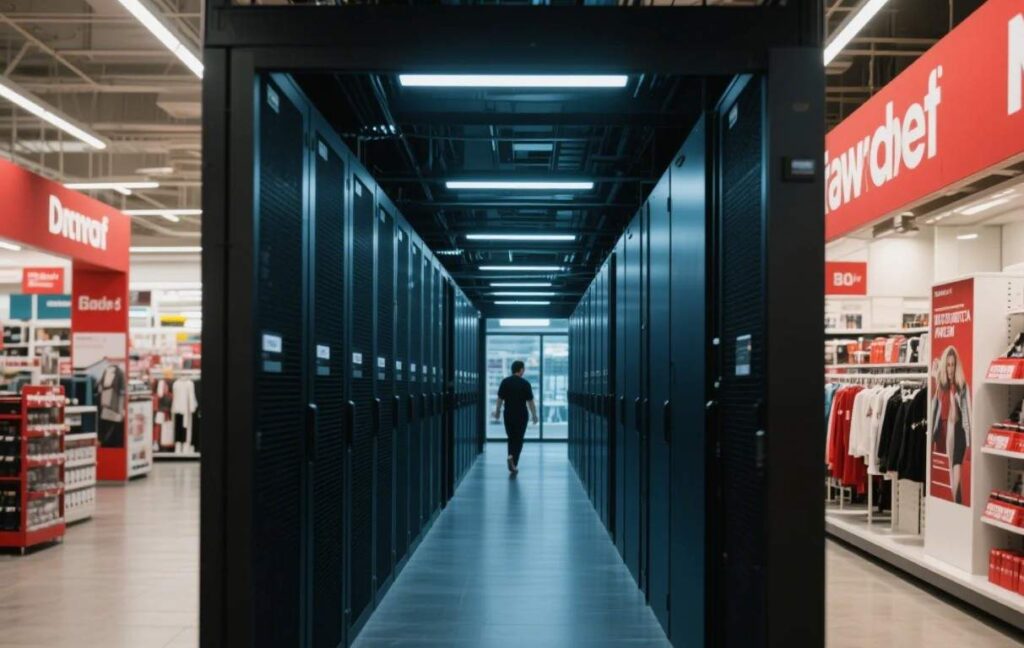
The new retail industry, blending online and offline shopping experiences, thrives on real-time data, seamless transactions, and personalized customer interactions. At the heart of this transformation lies advanced data center infrastructure, which powers the analytics, storage, and security needed to meet modern retail demands. This article explores how data centers enable new retail by addressing key challenges like real-time processing, cost efficiency, security, and scalability, while also supporting sustainability and innovation.
Challenges in New Retail
New retail operates in a highly competitive landscape where speed, efficiency, and trust are paramount. Retailers face several critical challenges:
- Real-Time Data Needs: Instant access to customer behavior, inventory levels, and sales metrics is essential for dynamic decision-making.
- Cost Pressures: Retailers must optimize operations to maintain profitability in a low-margin industry.
- Security Risks: Protecting sensitive customer and transaction data from breaches and cyberattacks is non-negotiable.
- Scalability Demands: Infrastructure must handle fluctuating data volumes, especially during peak shopping periods.
Data centers provide the backbone to overcome these hurdles, enabling retailers to deliver exceptional customer experiences while staying competitive.
How Data Centers Empower New Retail
Modern data centers offer specialized solutions tailored to the unique needs of new retail. Below are the key ways they drive success:
1. Enabling Real-Time Analytics
Data centers equipped with high-performance servers and large-scale storage systems allow retailers to process vast amounts of data in real time. This capability supports:
- Customer Insights: Analyzing purchasing patterns to offer personalized promotions.
- Inventory Management: Tracking stock levels to prevent overstocking or shortages.
- Market Responsiveness: Adjusting pricing or campaigns based on real-time trends.
By processing data instantly, retailers can make agile decisions that enhance customer satisfaction and operational efficiency.
2. Supporting High-Speed Transactions
Seamless transactions are critical for both online and in-store retail. Data centers with high-speed infrastructure ensure:
- Fast Payment Processing: Quick checkouts for in-store and e-commerce platforms.
- Low-Latency Operations: Rapid data retrieval for real-time offers and loyalty program integration.
- Peak Load Handling: Managing high transaction volumes during sales events or holidays.
This speed translates to smoother customer experiences and higher sales conversions.
3. Ensuring Robust Security
With cyber threats on the rise, data centers prioritize security to protect retail operations. Key features include:
- Physical Security: Restricted access to data center facilities to prevent unauthorized entry.
- Network Defenses: Firewalls, encryption, and intrusion detection systems to safeguard data.
- Compliance: Adherence to regulations like GDPR or PCI-DSS to protect customer information.
These measures build trust, ensuring customers feel confident sharing their data with retailers.
4. Offering Scalability and Flexibility
Retail data needs fluctuate with seasonal trends and business growth. Data centers provide:
- Scalable Storage: Expanding capacity to handle increasing data volumes.
- Modular Infrastructure: Allowing retailers to add resources as needed without major overhauls.
- Global Reach: Supporting multi-region operations for international retailers.
This flexibility ensures retailers can adapt to changing demands without compromising performance.
Strategic Benefits for Retailers
Data centers deliver several strategic advantages that redefine retail operations:
- Cost Efficiency: Optimized infrastructure reduces energy and maintenance costs, enabling competitive pricing.
- Reliability: Redundant systems ensure uninterrupted service, critical for 24/7 retail operations.
- Customer Experience: Real-time analytics and fast transactions enable personalized, frictionless shopping.
- Innovation Enablement: Data centers support emerging technologies like AI-driven recommendations and predictive analytics.
These benefits position retailers to thrive in a fast-paced, data-driven market.
Sustainability in Data Centers
As environmental concerns grow, data centers are adopting sustainable practices to align with retail’s push for eco-friendly operations. Many providers aim for:
- Carbon Neutrality: Targeting zero Scope 1 and 2 emissions through energy-efficient designs.
- Renewable Energy: Powering facilities with solar, wind, or other renewable sources.
- Green Certifications: Meeting standards like LEED to demonstrate environmental responsibility.
These efforts not only reduce environmental impact but also enhance brand reputation among eco-conscious consumers.
The Future of Data Centers in New Retail
Looking ahead, data centers will play an even greater role in shaping new retail. Integration of artificial intelligence (AI) and big data analytics will enable:
- Predictive Analytics: Forecasting demand to optimize inventory and staffing.
- Personalized Marketing: Using AI to deliver hyper-targeted campaigns.
- Augmented Reality (AR): Supporting immersive shopping experiences, like virtual try-ons.
Additionally, edge computing—where data is processed closer to the source—will reduce latency further, enabling faster in-store and online interactions. As 5G networks expand, data centers will leverage enhanced connectivity to support real-time applications across global markets.
Data centers are the unsung heroes of new retail, providing the infrastructure needed to process data, secure transactions, and scale operations. By addressing challenges like real-time analytics, cost efficiency, and security, they empower retailers to deliver seamless, personalized customer experiences. As sustainability and innovation become increasingly important, data centers will continue to evolve, integrating AI, edge computing, and green practices to shape the future of retail. For retailers aiming to stay ahead, investing in advanced data center solutions is not just an option—it’s a necessity.




